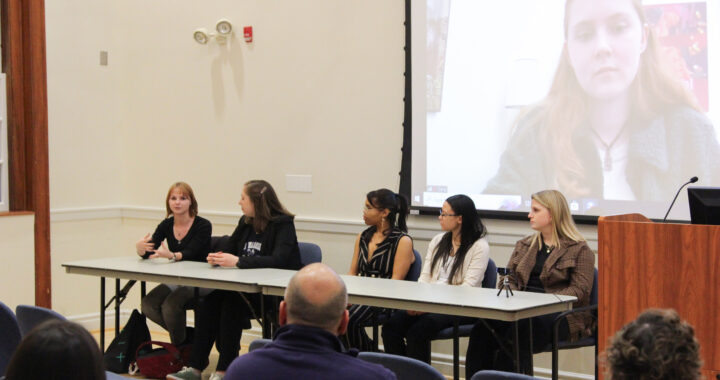HPV: what you might not know
3 min readBy NADIA CHOUDHRY
Farah Aziz, a 21-year-old from Maryland, never expected to face a cancer scare at such an early age.
After visiting her gynecologist for a routine check-up, she received a phone call that completely changed her perception of cancer.
Her Pap smear results came back abnormal.
“When I first got the phone call, I was confused. I really didn’t know what that meant,” said Aziz. “I was told to come back in six months to receive an additional Pap smear because the results could be abnormal for a variety of different reasons.”
“Having an abnormal pap [is] very common in younger women,” said Richmond obstetric gynecologist Dr. Joseph Borzelleca.
Heidi Simpson and L. Timmes Ross, both nurse practitioners at the UMW Women’s Clinic, agreed that having an abnormal Pap is normal for young girls and can be attributed to a variety of reasons, such as a yeast infection, bacterial infection or the Human Papillomavirus (HPV).
Aziz waited anxiously for six months to get another Pap smear, only to receive word of yet another abnormal result. Aziz learned that these results were due to HPV, which caused pre-cancerous cells to form in her cervix.
There are over 150 known HPV viruses, an estimated 40 of which are sexually transmitted.
According to the National Cancer Institute (NCI), 15 types of high-risk HPV strains cause virtually all cervical cancers. Other strains can cause vulvar cancer, anal cancer and oral cancer.
The NCI estimates that there are more cases of genital HPV infections than any other STI in the U.S. In 2010, over 12,000 women in the U.S. were diagnosed with cervical cancer and 4,000 women lost their lives to it.
Other low-risk strains of HPV can cause genital warts and, according to Simpson and Timmes, most types of HPV that do not cause cancer or genital warts are fought off by the body’s immune system.
“When I learned the facts about HPV and how it can cause cervical cancer, I was surprised that I didn’t know more about it before,” said Aziz. “We learn about all the different sexually transmitted diseases in school and how to protect ourselves, but we learn so little about HPV.”
Sexually transmitted HPV is highly contagious and is spread by skin-to-skin contact during vaginal, oral and anal sex with an infected partner, according to the NCI.
Condoms lower the risk of spreading HPV, but they do not fully protect against contracting the virus. Additionally, symptoms are not always apparent, so the virus is often unknowingly spread.
“Men can and do get the HPV virus [too],” said Borzelleca. “They are the chief vectors for spread [of HPV] among heterosexual women; however [they] don’t develop cancer so they infrequently have any consequences of their infections.”
Borzelleca explained that men can however get genital warts due to HPV and in rare occasions cancer of the penis is associated with HPV exposure.
According to Borzelleca, it takes most healthy women seven to 10 years before cancerous HPV cells actually become an invasive cancer.
“If the woman’s immune system is compromised by HIV, diabetes or smoking, the process can be accelerated to as a few as three years,” he warned.
Both nurses stressed that cervical cancer is easily avoidable due to the many tools available to prevent it, including regular screenings, practicing safe sex and by getting vaccinated.
The two vaccines that are available through prescription to prevent against the specific cancer-causing strains of HPV are Gardasil and Cervarix.
According to Borzelleca, vaccinations should begin at an early age, before a person is likely to be exposed to the virus.
“If you are already sexually active, then you could have already been exposed to one or all of the HPV types,” he said. “But, since there are no easy blood tests to find that out, you should still get vaccinated in case it can still provide you protection against HPV types you have not been exposed to.”
Aziz had the pre-cancerous cells in her cervix removed and says that as long as she keeps up with routine check-ups, she can live the rest of her life cancer and worry free.
“This experience was like a wake-up call for me,” she said. “Everyone needs to be better educated on HPV.”











